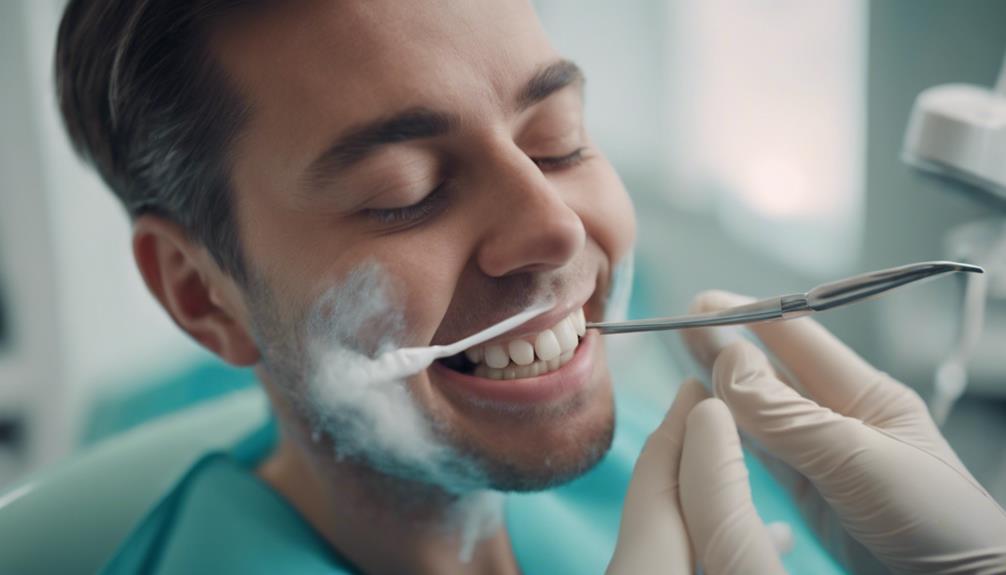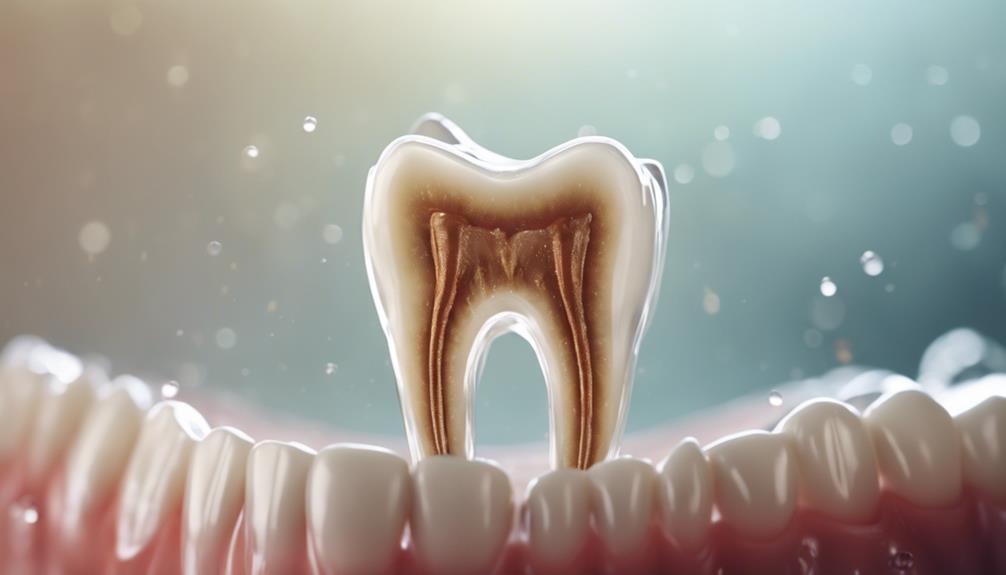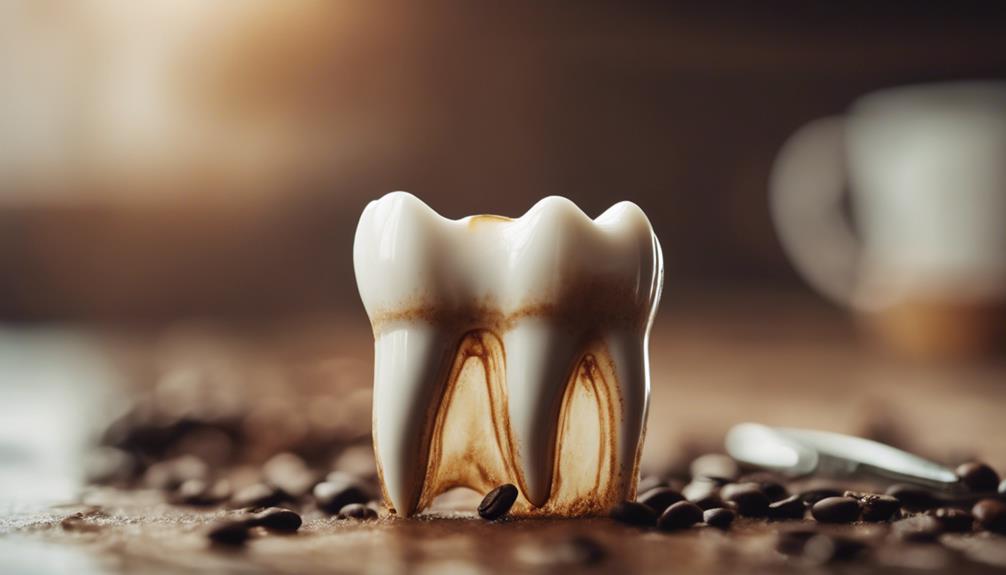Coffee can have a negative effect on your teeth because of its acidic nature and staining compounds like tannins. The acidity weakens enamel, while pigments stick to teeth, leading to cosmetic stains that can impact the appearance of your smile. Regular dental cleanings can help remove these stains, but maintaining proper oral hygiene is essential. Additionally, coffee reduces saliva production, which can weaken your mouth’s natural defenses against dental problems. To minimize stains, consider using a straw, brushing your teeth after drinking coffee, and rinsing with water. Staying hydrated is also important for reducing the negative impact of coffee on your teeth. For more information on how coffee affects dental health and effective preventive measures, you can visit this link: impacts your teeth.
Key Takeaways
- Coffee stains enamel due to tannins and pigments.
- Acidity weakens enamel, impacting dental health.
- Decreased saliva from coffee increases oral health risks.
- Hydration and dental cleanings mitigate coffee's negative effects.
- Proper oral hygiene minimizes coffee-related tooth issues.
Staining Effects of Coffee
Coffee stains your teeth due to tannins and pigments that adhere to the enamel. The acidity in coffee can weaken the enamel, making your teeth more vulnerable to staining.
While the stains from coffee are primarily cosmetic and don't directly harm the enamel, they can impact the appearance of your smile.
To combat coffee stains, regular dental cleanings are essential as they effectively remove the discoloration from your teeth. Additionally, practicing proper oral hygiene, such as brushing your teeth twice a day and flossing regularly, can help minimize the staining effects of coffee.
By taking good care of your teeth and staying on top of your dental care routine, you can prevent not only coffee stains but also other oral health issues like tooth decay.
Decreased Saliva Production

Reduced saliva production from coffee consumption poses a significant threat to your oral health by compromising the mouth's natural defenses against bacteria and acid erosion. Saliva plays an essential role in neutralizing acids and protecting tooth enamel, making its reduction from coffee a concern for oral health.
The decrease in saliva caused by coffee can contribute to a dry mouth sensation, increasing the risk of dental issues like cavities and gum disease. Without sufficient saliva to wash away food particles and bacteria, the mouth becomes more susceptible to plaque formation and enamel erosion.
To counteract the effects of decreased saliva production, it's essential to maintain adequate hydration and practice good oral hygiene habits. By hydrating well and ensuring proper dental care, you can help mitigate the negative impact of reduced saliva caused by coffee consumption on your oral health.
Strategies to Minimize Stains

Implementing effective strategies to minimize stains caused by coffee consumption can help maintain the brightness and health of your teeth. Using a straw while drinking coffee can reduce direct contact with your teeth, thereby minimizing the staining effects on the enamel surface.
Remember to brush your teeth 30 minutes after consuming coffee to remove dark pigments and prevent stains from setting in. Rinsing your mouth with water after drinking coffee is also beneficial as it helps wash away residue and prevents stain buildup on your teeth.
Additionally, drinking water after coffee boosts saliva production, aiding in washing away stains and protecting your tooth enamel. While these strategies can help reduce stains, it's essential to schedule regular dental cleanings, at least twice a year, to effectively remove coffee stains and maintain your oral health.
These dental treatments are vital in ensuring your teeth stay bright and healthy despite regular coffee consumption.
Importance of Dental Cleanings

Regular dental cleanings are essential to maintaining your oral health, as they help remove stubborn coffee stains and prevent plaque buildup. These professional cleanings not only keep your teeth looking bright but also allow for early detection of any issues related to coffee consumption.
Dental Check-Up Frequency
Ensuring you schedule biannual dental check-ups is crucial for maintaining peak oral health and preventing costly dental issues. By visiting your dentist twice a year for regular check-ups, you can keep your teeth healthy and receive professional cleanings to remove plaque buildup.
These visits play an essential role in detecting early signs of dental problems, allowing for timely intervention and preventing the need for extensive treatments in the future. In addition to keeping your teeth in top condition, biannual dental visits also provide an opportunity for professional teeth whitening treatments to enhance your smile.
Attending these appointments on a regular basis not only safeguards your oral health but also saves you from potential financial burdens associated with advanced dental procedures. By prioritizing your dental check-up frequency and committing to biannual dental visits, you're taking proactive steps towards maintaining a healthy smile and preventing costly dental issues in the long run.
Benefits of Cleanings
To maintain peak oral health, it's important to prioritize getting regular dental cleanings. These cleanings play a vital role in preventing gum disease and cavities. Professional dental cleanings remove plaque and tartar buildup that regular brushing alone can't reach.
By attending these cleanings, early signs of oral health issues such as decay or gingivitis can be detected and addressed promptly. Additionally, cleanings contribute to maintaining fresh breath and a bright smile by effectively removing surface stains.
Neglecting dental cleanings can lead to more extensive and costly dental treatments in the future. It's essential to schedule and attend regular dental cleanings to ensure the overall health of your teeth and gums.
Preventing Dental Problems
Maintaining excellent oral health requires prioritizing routine dental cleanings to prevent dental problems and preserve the health of your teeth and gums.
When it comes to preventing dental issues related to coffee consumption, professional cleanings play an essential role. Here's why:
- Teeth Whitening: Professional cleanings offer an opportunity for whitening treatments to counteract staining caused by drinking coffee.
- Plaque Removal: Regular dental cleanings help remove coffee stains and prevent plaque buildup, which can lead to more severe dental problems if left unchecked.
- Early Detection: Professional cleanings can detect early signs of dental issues exacerbated by coffee consumption, allowing for timely intervention and prevention of further complications.
Hydration and Tooth Health

Staying adequately hydrated plays a vital role in safeguarding the health of your teeth. When you drink your coffee, remember to follow it up by rinsing your mouth with water.
Hydration is essential in maintaining saliva production, which is necessary for protecting your tooth enamel. By drinking water after coffee, you can reduce the impact of enamel erosion and staining caused by coffee residues. Water helps to rinse away these residues, preventing the buildup of stains on your teeth.
Proper hydration not only supports overall oral health but also aids in saliva's natural cleaning process. Adequate water intake can counteract the drying effect of coffee, benefiting both your teeth and gums.
Coffee Vs. Tooth Decay

Hydration plays an important role in protecting your teeth from the potential harmful effects of coffee. The acidity and sugar in some coffee beverages can contribute to tooth decay.
When comparing coffee to tooth decay, it's important to take into account the following:
- Sugar: Sugary coffee drinks promote bacteria growth, leading to plaque formation and potential cavities.
- Acidity: Acidic coffee can erode tooth enamel, making teeth more susceptible to decay over time.
- Oral Hygiene: Limiting sugary additives and practicing good oral hygiene can help mitigate the risk of tooth decay from coffee consumption.
To prevent tooth decay from coffee, it's crucial to be mindful of the sugar content in your coffee choices and maintain good oral hygiene practices.
Regular dental check-ups are also necessary for detecting and addressing any potential tooth decay or enamel erosion caused by coffee.
Frequently Asked Questions
How Can I Drink Coffee Without Damaging My Teeth?
To enjoy coffee without harming your teeth, consider using a straw to minimize direct contact. Wait 30 minutes before brushing to prevent enamel damage and remove stains effectively.
Rinse your mouth with water after coffee to wash away residue. Regular dental cleanings are essential for stain removal.
Drinking water after coffee boosts saliva production, protecting enamel. Follow these tips to savor your coffee while safeguarding your oral health.
Does Coffee Ruin Your Teeth?
Coffee, though a beloved beverage, can indeed have detrimental effects on your teeth. Its acidic nature can erode enamel, leading to sensitivity, while tannins cause unsightly stains.
Adding sugar or cream only worsens the situation, promoting decay. Regular dental cleanings are essential to combat these effects.
As you enjoy your daily cup of joe, remember to prioritize oral health to prevent coffee from ruining your teeth.
How Many Coffees a Day Is Bad for Your Teeth?
Drinking more than 4 cups of coffee daily can harm your teeth due to increased enamel erosion, staining, and cavity risk. Prolonged exposure to acidity from continuous coffee consumption can further impact dental health negatively. Additionally, drinking coffee with braces can exacerbate these issues as the brackets and wires create more areas for the coffee to become trapped and cause staining. It is important to maintain good oral hygiene and visit your dentist regularly if you are a frequent coffee drinker, especially if you have braces. Consider reducing your coffee intake or using a straw to minimize contact with your teeth.
To minimize these effects, limit your daily coffee intake to 1-2 cups. By moderating your coffee consumption, you can reduce the likelihood of enamel damage and staining, promoting better oral health overall.
How Many Cups of Coffee a Day Will Stain Your Teeth?
Drinking multiple cups of coffee each day can gradually stain your teeth, mainly due to the beverage's pigments and acidity. Over time, these factors can lead to noticeable discoloration on the tooth surface.
To prevent extensive staining, moderation in coffee consumption and a commitment to good oral hygiene are key. Regular dental cleanings can also help in removing coffee stains and maintaining your oral health.
Manage your coffee intake and prioritize preventive dental care to reduce the risk of significant teeth discoloration.
Conclusion
To sum up, while coffee can have staining effects on your teeth, proper oral hygiene and regular dental cleanings can help minimize these effects.
Remember, staying hydrated and maintaining good saliva production are key factors in preserving your tooth health.
So, enjoy your coffee in moderation, and don't forget to schedule those dental appointments to keep your smile bright and healthy.
Just like a well-oiled machine, a little maintenance goes a long way in keeping your teeth in top condition.









